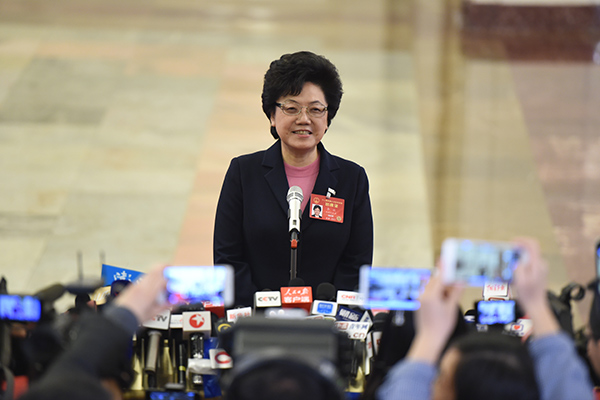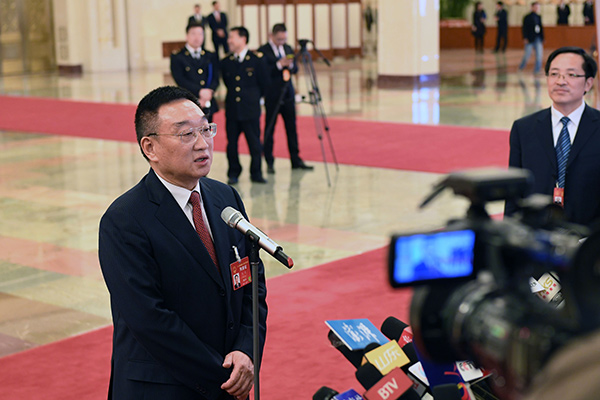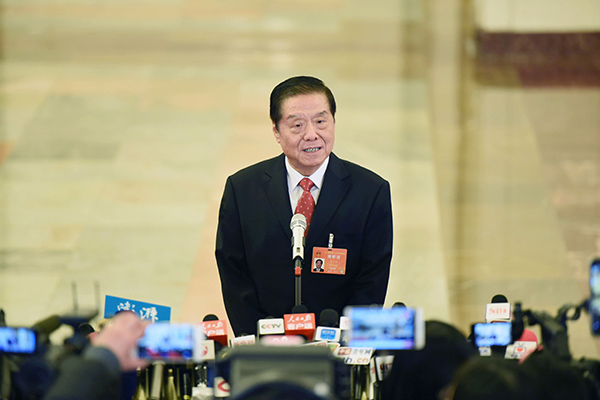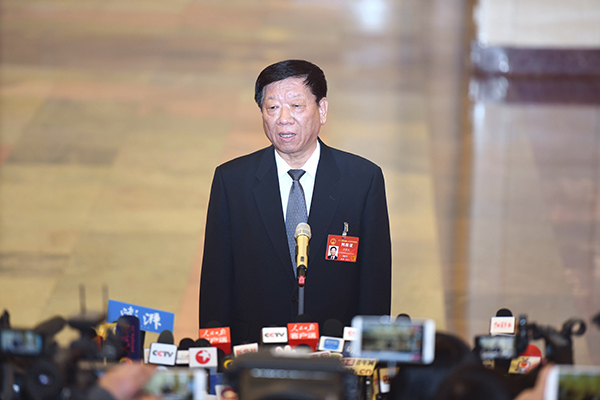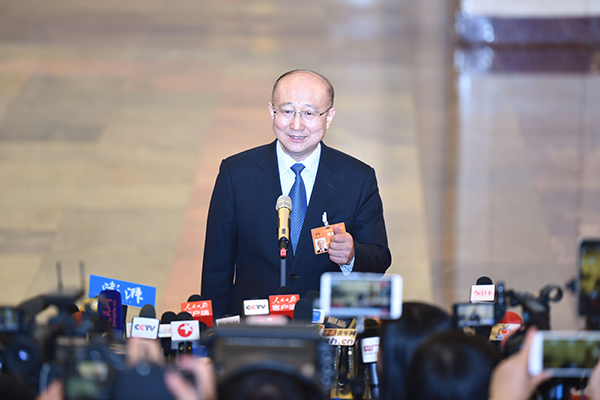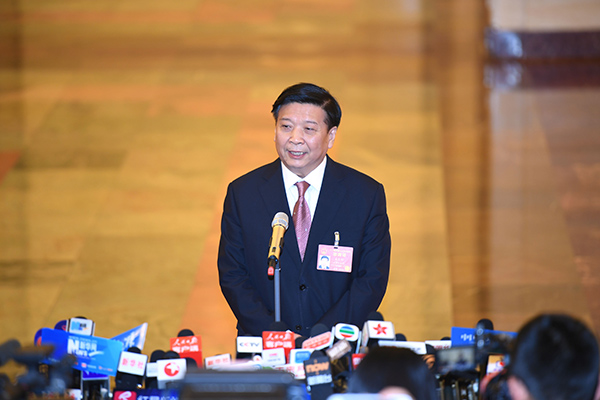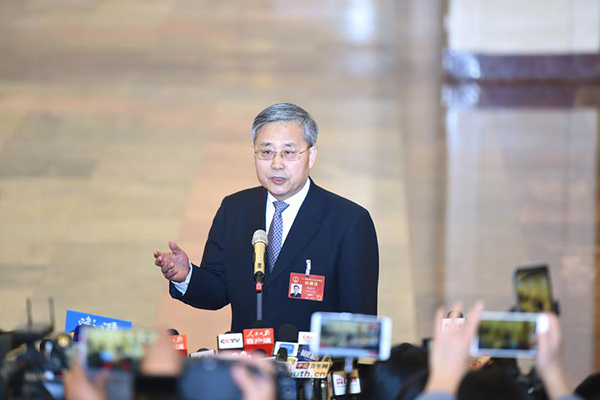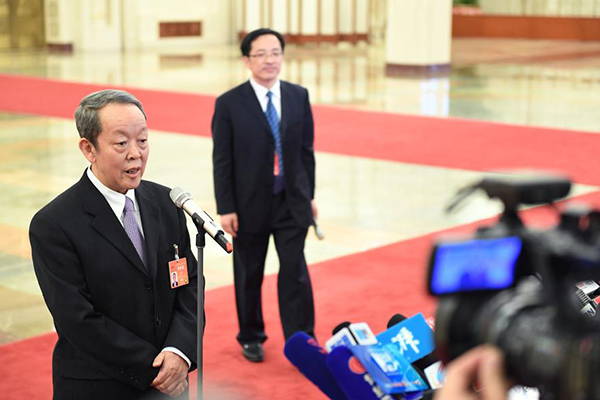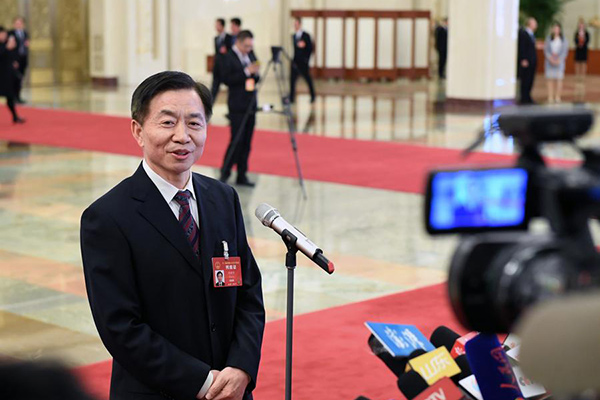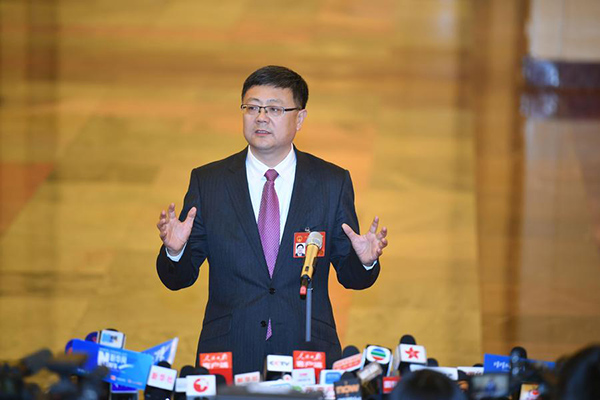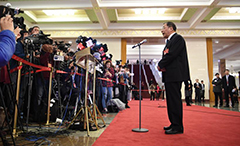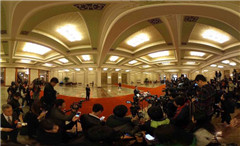March 8: 11 ministers’ views from ‘ministers’ passage’
2017-03-09
chinadaily.com.cn
Eleven ministers took questions from reporters along the famous “ministers’ passage” before the fifth session of the 12th National People’s Congress, the country’s top legislature, held its second plenary meeting at the Great Hall of the People in Beijing at 3 pm on March 8.
The “ministers’ passage”, also known as “the ministers’ red carpet”, is the 100-meter passage near the northern gate of the Great Hall of the People where ministers and other high-ranking officials must walk through before entering the meeting hall.
Chinese hospitals to get 89,000 extra maternity beds
 Li Bin, head of the National Health and Family Planning Commission, receives an interview before the meeting, March 8, 2017.[Photo/Xinhua]
Li Bin, head of the National Health and Family Planning Commission, receives an interview before the meeting, March 8, 2017.[Photo/Xinhua]
Li Bin, the minister of the Health and Family Planning Commission, said a “green passage” has also been set up to ensure efficient patient referrals and quality neonatal treatment.
The moves are part of efforts to better meet clinical demands, particularly for women aged 35 or older who want a second child.
China introduced its universal second-child policy last year and about half of the women who became eligible to have another child were aged at least 35, according to the commission.
Li said the number of pediatricians will also be increased to handle the expected increase in births.
Last year, China recorded 17.86 million newborns, up by more than 1.3 million on 2015. Population scientists have predicted a baby boom in three years.
To ensure healthy development, the commission has been promoting a brochure on mother and children’s health that includes pregnancy tips, information on hospital delivery, and immunization programs.
Li said the commission will work closely with other government agencies such as education, social security and finance to ensure the second-child policy is implemented properly.
Less flooding but drought may be more severe, minister says
 Minister of Water Resources Chen Lei receives an interview before the meeting, March 8, 2017.[Photo/Xinhua]
Minister of Water Resources Chen Lei receives an interview before the meeting, March 8, 2017.[Photo/Xinhua]
Chen told reporters at the sidelines of the National People’s Congress that South China and East China could still experience flooding in river basin areas including the Pearl River, Taihu Lake and the Huaihe River this year.
There could also be some flooding along the Yellow and Yangtze rivers this year and the number of typhoons expected to hit the country will be in line with previous years, he said.
However, Chen said the overall severity of flooding would be less than last year, when the country experienced the heaviest flooding in South China since 1998.
Meanwhile, the country may experience more severe drought this year, especially in Northwest and North China, he said.
The ministry has already embarked on efforts to repair 17,600 flood-control facilities that were damaged during last year’s flooding, and the work is expected to be finished before June, he said.
The ministry has already started nationwide checkups on the preparation for the upcoming flood season.
“We will be prepared for the worst scenarios,” he said.
Positive outlook for foreign trade in 2017
 Minister of China’s General Administration of Customs Yu Guangzhou receives an interview before the meeting, March 8, 2017. [Photo/Xinhua]
Minister of China’s General Administration of Customs Yu Guangzhou receives an interview before the meeting, March 8, 2017. [Photo/Xinhua]
The country’s foreign trade rose by 20.6 percent in renminbi on a year-on-year basis in the first two months of 2017, data from GAC showed. China will further crack down on smuggling of foreign agricultural products this year to better safeguard the nation’s foreign trade, according to Yu.
The minister added the government will cut the time for cargo clearance by over 30 percent this year, as well as providing free mandarin lessons to dialect-speaking domestic business owners and their staff to raise the efficiency for customs procedures.
China sets target to create 11 million urban jobs
 Minister of Human Resources and Social Security Yin Weimin receives an interview before the meeting, March 8, 2017.[Photo/Xinhua]
Minister of Human Resources and Social Security Yin Weimin receives an interview before the meeting, March 8, 2017.[Photo/Xinhua]
The target, announced by Yin Weimin, minister of human resources and social security, comes as an estimated 15 million workers are expected to enter the job market in urban areas.
Among them will be 7.95 million college graduates and more than 3 million rural laborers, Yin said, adding that the challenge comes not only from the large influx, but also from an unbalanced labor structure.
He explained that there is a shortage of high-skilled labors, while it is difficult for elderly workers without skills to find a job.
The central government will encourage entrepreneurship and step up efforts to promote vocational training, Yin said, adding that one aim will be to find employment for at least one member of each family currently out of work.
Last year, China created 13.14 million jobs for urban residents. The registered unemployment rate in urban areas was 4.02 percent, almost 0.5 percentage points lower than the government’s target for 2016.
Progress made on improving product quality
 Zhi Shuping, director of the General Administration of Quality Supervision, Inspection and Quarantine of China, receives an interview before the meeting, March 8, 2017.[Photo/Xinhua]
Zhi Shuping, director of the General Administration of Quality Supervision, Inspection and Quarantine of China, receives an interview before the meeting, March 8, 2017.[Photo/Xinhua]
In the past year, the administration has made great progress to improve the quality of products sold on the market, focusing on 10 kinds of major consumer goods, including air purifiers, smartphones and diapers, he said.
Of these goods, products which met standards increased by 5.2 percentage points last year, compared with 2015, according to inspections organized by quality monitors, he said.
Curb land speculation
 Minister of Land and Resources Jiang Daming receives an interview before the meeting, March 8, 2017.[Photo/Xinhua]
Minister of Land and Resources Jiang Daming receives an interview before the meeting, March 8, 2017.[Photo/Xinhua]
Cities where housing prices are under huge pressure of rising should raise the supply of residential land, while those with excess housing inventory should reduce the supply, he said, adding that local governments should regulate the real estate market based on their specific conditions.
Referring to the renewal of the right to use land after it expires, Jiang said research is being conducted and promised that people’s property will be protected according to the law.
Head of banking regulatory body confident of credit flowing to real economy
 Guo Shuqing, chairman of China Banking Regulatory Commission, takes questions on the sidelines of the national legislature annual session in Beijing on Mar 8, 2017.[Photo/Xinhua]
Guo Shuqing, chairman of China Banking Regulatory Commission, takes questions on the sidelines of the national legislature annual session in Beijing on Mar 8, 2017.[Photo/Xinhua]
The problems faced by the sector are inevitable given the sheer size of the country’s banking system, said Guo.
“Our banking sector has grown enormously since the reform and opening-up. The asset scale totals $3.3 trillion, surpassing Europe, United States and Japan,” said Guo.
Chinese banks extended 2 trillion yuan ($295 billion) new yuan loans in January, doubling from what was recorded a month earlier, according to central bank data. Mortgages accounted for less than one third of the total, registering 14 percent lower than last year.
Central government on HK’s election
 Wang Guangya, director of the Hong Kong and Macao Affairs Office of the State Council, receives an interview on the sidelines of the meeting, March 8, 2017, Beijing.[Photo/Xinhua]
Wang Guangya, director of the Hong Kong and Macao Affairs Office of the State Council, receives an interview on the sidelines of the meeting, March 8, 2017, Beijing.[Photo/Xinhua]
First, the election concerns the central government’s authority, so it is necessary and reasonable for the central government to pay attention to the issue, which is also its duty.
Second, the central government has its own standards for the leader of Hong Kong: Love of country, especially Hong Kong SAR, trusted by the central government, ability to manage and supported by Hong Kong people.
Third, the election should be in accordance with laws and regulations, and the final candidate should meet the requirements of the central government.
Campaign to boost elderly care services
 Minister of Civil Affairs Huang Shuxian receives an interview before the meeting, March 8, 2017. [Photo/Xinhua]
Minister of Civil Affairs Huang Shuxian receives an interview before the meeting, March 8, 2017. [Photo/Xinhua]
“Caring for the aged has been discussed many times by the Party and the central government,” Huang Shuxian, minister of civil affairs, said during the ongoing session of the National People’s Congress, the legislature.
“China doesn’t have enough qualified eldercare nursing facilities right now,” he said, but added, “We will encourage all areas of society to participate in the campaign.”
The government will also provide more services to support people caring for elderly relatives at home, which is in line with traditional Chinese culture, and provide suitable public activity areas for senior citizens, he said.
Air pollution probe finds 2,000 faults
 Minister of Environmental Protection Chen Jining meets the media during the annual session of the National People’s Congress in Beijing March 8, 2017.[Photo/Xinhua]
Minister of Environmental Protection Chen Jining meets the media during the annual session of the National People’s Congress in Beijing March 8, 2017.[Photo/Xinhua]
The ongoing monthlong environmental inspection of the Beijing-Tianjin-Hebei region and neighboring provinces has exposed over 2,000 pollution problems, the environmental protection minister said on March 8.
Each problem will be investigated, with the results released to the public, Chen Jining said on the sidelines of the annual session of the National People’s Congress.
More than 260 inspectors from the ministry and provincial environmental authorities have inspected over 6,000 government departments and companies since Feb 15.
Governments that have failed to solve pollution problems face measures to make them to work harder on reducing air pollution, Chen said.
He said the ongoing inspection was working and that the ministry plans to conduct another one or two rounds of large-scale inspections this year in the Beijing-Tianjin-Hebei region and neighboring provinces, which saw severe smog in the winter.
